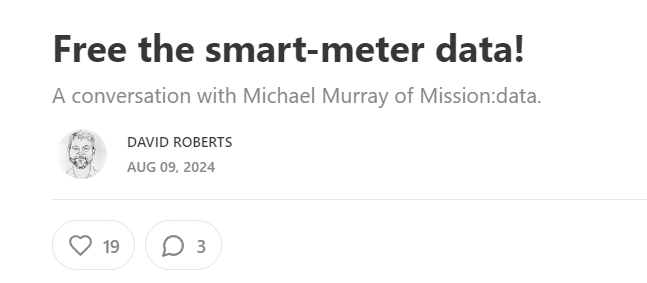Now that it’s 2025, how should we improve permissioned access to energy data? What should policymakers focus on?
“Enforcement, enforcement, enforcement.”
That was my answer to a question posed last month at the Colorado Solar and Storage Association’s conference in Denver. Enforcement has been on my mind because of two contrasting events – one in American politics, the other involving utility regulation – that perfectly underscore its importance at this moment.
While Americans are focused on today’s election, today’s post looks at our northern neighbor. Ontario, Canada’s provincial regulation 633/21 calls for all electric and gas utilities in Ontario to offer Green Button Connect (GBC) by November 1, 2023. So, now that we’re one year into this policy, how are things going?
First some background. Ontario’s Green Button policy is unique in North America due to the sheer number of utilities that are involved - about 57. According to our Green Button Explorer, the USA has only 27 utilities with a GBC mandate. Thus, Ontario is a laboratory for the widest range of implementation types across North America. This variety essentially stress-tests the concept of standardization: supposedly, the regulation requires each utility to be certified by the Green Button Alliance. So our first-year review is also asking the question: Is certification working?
The Biden Administration’s actions in the past week demonstrate a truly remarkable bipolarity with regard to empowering consumers.
Yesterday, the Consumer Financial Protection Bureau (CFPB) issued sweeping data portability rules for banks and fintechs. Known as “open banking,” the requirements allow consumers to have their banking data – transaction history, interest rates and loan information – transferred seamlessly to competing services. The rules are the culmination of a multi-year commitment by the Democratic party to support customer choice, prevent “lock-in,” and fuel competition on price and service quality.
But last Friday in another part of the Biden Administration, the Department of Energy (DOE) dismissed data portability requirements entirely for $2 billion in grants to electric utilities.
In order for demand response to grow and reduce wholesale power costs, we would be better off ripping out smart meters and going back to once-a-month meter readings.
That’s the implication from the Federal Energy Regulatory Commission’s (FERC) recent decision in which FERC dismissed a complaint by CPower against PJM Interconnection. CPower alleged that PJM’s tariff is unduly discriminatory because it requires Curtailment Service Providers (“CSPs”) to provide interval usage data for all customers with advanced meters.
But utilities often deny CSPs access to this information. FERC’s three Democratic Commissioners – Willie Phillips, David Rosner and Judy Chang – were appointed by President Biden and voted to deny the complaint.
September 19, 2024 – Mission:data Coalition, a nonprofit advocate for energy data portability, provides the following reaction to today’s FERC order denying CPower’s complaint. CPower alleged that PJM Interconnection’s (“PJM”) tariff is unduly discriminatory because it requires Curtailment Service Providers (“CSPs”) to provide interval usage data for all customers with advanced meters, but utilities often deny CSPs access to this information.
“Today’s order marks the beginning of the ‘Data Barriers’ era,” said Michael Murray, Mission:data’s co-founder and president. “Statistical sampling and submeters are poor substitutes for utility meter data. The time has come to force utilities to put customers in charge of their own information, rather than pursue workarounds."
....
With over 13 million Americans experiencing “dangerous” heat levels this week, we are reminded of how the cracks in our infrastructure begin to show as the mercury rises, like distribution transformers failing at sustained 110F temperatures, as happened in Spokane, WA during a previous “heat dome” event.
Energy data is infrastructure, too – and just because it’s digital doesn’t mean it’s immune from strain during a heat wave. Here are four ways our data infrastructure is crumbling, showing us that investments are sorely needed.
Today, Mission:data announced its first Green Button Scorecard™ release covering the terms and conditions of data portability for 15 utilities in Ontario, Canada.
Data recipients are forced to agree to the utilities’ terms and conditions in order to be granted access to customer’s energy usage, billing and account information. The terms and conditions have been disputed since O. Reg. 633/21 took effect November 1, 2023, which required local distribution utilities to offer Green Button Connect My Data (GBCMD). Energy management firms and Mission:data have noted that, because utilities’ terms are not individually approved by the Ontario Energy Board (OEB), monopoly utilities can use their power to demand one-sided contracts with unfair or anti-competitive provisions.
Findings include:
With a 1-to-5 scale (1=lowest, 5=highest), scores ranged from 2.1 (Bluewater Power Distribution) to 3.5 (Alectra Utilities, non-Guelph region).
The University of New Brunswick (UNB) is the first Canadian university to work with large volumes of utility billing and metering data from multiple utilities. This research seeks to determine whether this newly available data differs from historical data in terms of accuracy, completeness, and consistency with other available sources. A critical aspect of the investigation is to ensure that the quality of the data does not compromise Ontario’s efforts to decarbonize its economy, as unreliable data can obstruct clean energy solutions such as energy conservation and demand management planning, demand response, and virtual power plants.
We developed a first-ever interactive demonstration, the Green Button Consent Toolkit. Users can input different scenarios and see what the customer sees: the accounts to be selected, the amount of historical data to be shared, and disclaimers to be presented.
Today, the Green Button market opened in Ontario, and Mission:data Coalition announces its intention to evaluate the quality of each electric and gas utility’s Green Button implementation. The forthcoming Green Button Scorecard™ is designed with three purposes in mind: (1) to provide the market with a centralized information resource about each utility’s offerings, (2) to provide metrics for continuous improvement as Ontario embarks on its journey toward energy data portability, and (3) to provide the government, utilities, third parties and utility accountholders with a platform to work together to serve the common goals of open data, competition and energy savings.














